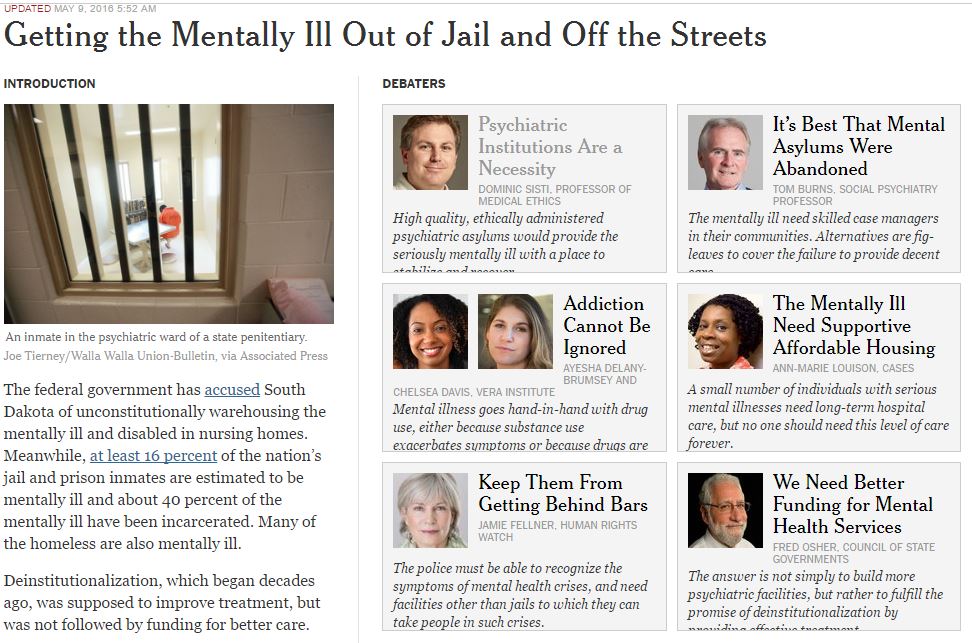In the Room for Debate section of this weekend’s New York Times, specialists in ethics, psychiatry, social work, addiction, and human rights hash out their opinions on the state of inpatient psychiatric treatment.
-
I suppose it’s good that the NY TImes is having this debate, however I see it as really limited in scope. One of the deinstitutionalizers would pump more money into “mental health”, and I see that as very problematic. Given that the Times credits “mental illness” with a tangible existence on the opening page, I guess you know what to expect.
The scariest person in this discussion is the professor of medical ethics–he wants more institutions–and that has been my feeling for sometime now, that some of these people in the field of ethics are the most unethical people in the world. I wish, in a sense, that ethics was about ethics, but mostly I find that it’s about some kind of authoritarian evasion of the principle of non-interference. Were we a Star Trek rerun, the whole universe would be going to hell in a hand-basket.
-
Hard to give any credibility to this discussion when all the commenters are talking about “mental illnesses” as discrete things causing people’s problems, while giving hardly any mention to the poverty, abuse, neglect, and inequality that is driving the development of chronic terror/depressed feelings/inability to function (what is mislabeled “serious mental illness”).
It’s simply jawdropping to see how simpleminded and ignorant some of the professors at some of our “best” universities are.
I wonder what the return on investment for mental prisons in terms of reduced need for disability payments is. I bet it’s pretty terrible. Mental prisons are so terrified of risk (e.g. completed suicides) and so overinvested in drugging and restraining people that hardly any meaningful therapeutic relationships get formed there due to the coercion and dehumanization that are innately part of these institutions.
-
To give credit, a couple of the commenters did mention the social contextual issues that I listed above like poverty and loneliness. Most didn’t. With some of the college professors, one has to wonder if they have ever really gotten to know or worked with “mentally ill” people in person at all. They write with such a distance and sense of depersonalization that they sound almost like recently-arrived aliens studying these strange human beings with the so called mental illnesses.
-
-
No one mentions voluntary patients versus forced. The commenters are as crazy as the people they feel the need to help. No one asks ” Was this person always mentally ill?”.
Many use the term “schizophrenia” as if it means something.Headlines are funny.
“Psychiatric Institutions Are a Necessity” It is a jail that isn’t a jail.“The Mentally Ill Need Supportive Affordable Housing” if a person is “mentally ill” they can not look after themselves and where they live. If a person can look after themselves and where they live, are they mentally ill? No , so then they don’t qualify for assistance.
“How to Keep the Mentally Ill From Getting Behind Bars” Ridiculous. If someone breaks a serious enough law, yes they have to go behind bars for the protection of people in society that can follow the rules. Law too tough or too weak? Change the law.
“We Need Better Funding for Mental Health Services. The answer is not simply to build more psychiatric facilities, but rather to fulfill the promise of deinstitutionalization by providing effective treatment ” What is effective treatment? More drugs? Drugs for life? plus “People with mental illnesses have unique needs, and their overrepresentation in jail, prison and other ill-equipped settings is a national tragedy.” Over representation? If a person is not fitting into the Capitalism system they get named “mentally ill” by a modern day priest.
-
Olden days described here http://cantonasylumforinsaneindians.com/history_blog/early-madness/
I assume everyone has trial before a jury , before being punished for crimes, and you can’t put people in prison for crimes you believe they will perform some time in the future. -
People are just plain disenfranchised. Disillusioned. Discouraged. Unemployed. Schools aren’t serving kids. Ninety-nine percent get assembly-line medical care, they get pain pills instead of real attention to what’s wrong, leading to addiction. Communities aren’t caring anymore. The focus is less and less on listening to each other. More on shoving people into therapy and less on closeness and friendship. Too much Facebook, too many walls. Yeah, folks are disenfranchised. I don’t think that’s “illness.” It’s a normal response.
Wake up, doc.















